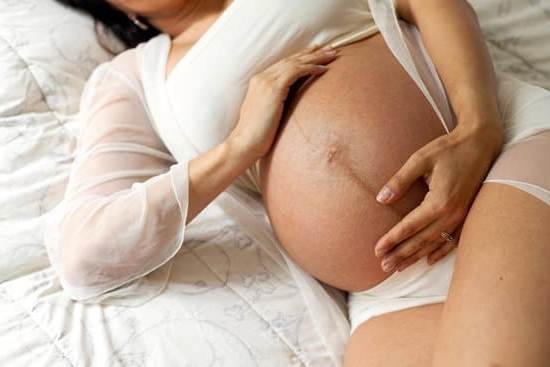Finding out whether you are pregnant or not can be an exciting and nerve-wracking experience. One of the common questions that arises during this time is: how long does it take for a pregnancy test to show a positive result? Understanding the timeline of when a pregnancy test can accurately detect pregnancy is crucial for those who are eagerly awaiting confirmation.
Pregnancy tests are designed to detect the hormone hCG in urine, which is produced by the placenta after a fertilized egg attaches itself to the uterine lining. Typically, most home pregnancy tests claim to be able to detect hCG levels as early as 7-10 days after conception. However, the accuracy of these tests can vary depending on various factors such as the sensitivity of the test and how it is used.
Factors that may affect the accuracy of a pregnancy test include how soon after conception it is taken, the concentration of hCG in your urine, and whether the instructions on how to use the test were followed correctly. It is important to follow proper guidelines for taking a pregnancy test in order to minimize the chances of receiving false results.
In the following sections, we will delve deeper into understanding how pregnancy tests work and explore early signs of pregnancy that may prompt you to take a test.
Understanding Pregnancy Tests
Types of Pregnancy Tests
There are two main types of pregnancy tests: urine tests and blood tests. Urine tests, which are commonly used at home, detect the presence of hCG (human chorionic gonadotropin) hormone in your urine. On the other hand, blood tests can detect hCG earlier than urine tests and provide more accurate results. Blood tests are usually performed at a healthcare provider’s office.
How Pregnancy Tests Detect Pregnancy
Pregnancy tests work by detecting the presence of hCG hormone in your body. This hormone is produced by the cells that form the placenta, which nourishes the fertilized egg after it attaches to the uterine lining. When you become pregnant, hCG levels rise rapidly in the early weeks of pregnancy. Home pregnancy tests can detect minimal levels of hCG in your urine to confirm whether you are pregnant or not.
Accuracy of Pregnancy Tests
The accuracy of a pregnancy test depends on various factors such as how soon you take the test after conceiving, the sensitivity of the test, and how well you follow the instructions. For most home pregnancy tests, they claim to be up to 99% accurate when taken on or after the day of your expected period.
However, taking a test too early may result in a false negative result since hCG levels may not be high enough to detect yet. It is recommended to wait at least one week after a missed period to take a pregnancy test for more accurate results.
How Pregnancy Tests Work
When it comes to understanding how pregnancy tests work, it is essential to know the science behind these tests. Pregnancy tests detect the presence of human chorionic gonadotropin (hCG) in a woman’s urine or blood. hCG is a hormone produced by the placenta shortly after implantation occurs, typically about six days after fertilization. This hormone is only present during pregnancy, making it a reliable indicator of whether or not a woman is pregnant.
There are two main types of pregnancy tests: urine tests and blood tests. Urine tests are more commonly used and can be easily purchased over-the-counter at pharmacies. These tests involve dipping a test strip into a urine sample or placing drops of urine on a specific area of the test. On the other hand, blood tests are usually performed at a doctor’s office and can detect lower levels of hCG earlier in pregnancy than urine tests.
- Urine Tests: These are convenient and affordable.
- Blood Tests: These are more accurate and can detect pregnancy earlier.
The amount of time it takes for a pregnancy test to show a positive result depends on various factors. The sensitivity of the test, the concentration of hCG in the urine or blood, and when implantation occurred all play a role in determining how soon a pregnancy test will detect hCG and show a positive result.
Typically, most over-the-counter urine pregnancy tests can accurately detect hCG levels about one week after a missed period, though some may claim results sooner.
- Sensitivity of the Test
- Timing of Implantation
- Concentration of hCG
Factors Affecting the Accuracy of Pregnancy Tests
When it comes to pregnancy tests, accuracy is crucial for getting reliable results. There are several factors that can affect the accuracy of a pregnancy test, including:
- Timing: One of the most important factors in determining the accuracy of a pregnancy test is when it is taken. Pregnancy tests work by detecting the hormone hCG in your urine, which is produced during pregnancy. It typically takes about 6-12 days after ovulation for the hCG levels to be high enough to be detected by a pregnancy test.
- Type of Test: There are different types of pregnancy tests available, such as urine tests and blood tests. Urine tests are more commonly used and are usually accurate if taken correctly. Blood tests, on the other hand, can detect hCG levels earlier than urine tests but are usually done at a doctor’s office.
- Expiration Date: Using an expired or faulty pregnancy test can also affect its accuracy. It is important to check the expiration date and follow the instructions carefully to ensure reliable results.
It’s essential to consider these factors when taking a pregnancy test to increase the chances of obtaining accurate results. If you have any doubts about the accuracy of your test or if you have conflicting results, it is recommended to consult with a healthcare provider for further guidance.
Remember that while understanding these factors can help determine the accuracy of a pregnancy test, it is important to always confirm with a healthcare professional for proper diagnosis and care.
Early Signs of Pregnancy
When a woman suspects she may be pregnant, early signs and symptoms can play a crucial role in confirming her suspicions. While these indications vary from person to person, there are some common early signs of pregnancy to look out for.
Some women may experience implantation bleeding which is lighter bleeding than a regular period and occurs when the fertilized egg attaches to the uterine wall. Other well-known early pregnancy symptoms include fatigue, breast tenderness, nausea or morning sickness, frequent urination, and mood swings.
It is essential to note that experiencing one or more of these symptoms does not necessarily confirm pregnancy as they can also be linked to other conditions. The best way to confirm pregnancy is by taking a pregnancy test. However, many women often wonder how long it takes for a pregnancy test to show positive results.
Most home pregnancy tests work by detecting the presence of human chorionic gonadotropin (hCG) in urine. This hormone is produced once a fertilized egg attaches itself to the uterine wall, typically around six days after fertilization.
The timeframe for when a pregnancy test will show positive results can vary depending on the sensitivity of the test used and the concentration of hCG in an individual’s urine. Some tests can provide accurate results as early as seven days after conception, but most recommend waiting until at least the day of your missed period for best accuracy.
It is crucial to follow the instructions on the pregnancy test package carefully to ensure accurate results and consult with a healthcare professional if there are any concerns about pregnancy or test results.
| Early Pregnancy Symptom | Description |
|---|---|
| Implantation Bleeding | Light bleeding when the fertilized egg attaches to the uterine wall. |
| Fatigue | Increased tiredness often experienced in early pregnancy due to hormonal changes. |
| Mood Swings | Rapid changes in emotions attributed to hormonal fluctuations during early pregnancy. |
When to Take a Pregnancy Test
When it comes to taking a pregnancy test, timing is crucial for obtaining an accurate result. The accuracy of a pregnancy test greatly depends on when it is taken in relation to your menstrual cycle. Most home pregnancy tests claim to detect pregnancy as early as the first day of a missed period. However, for the most accurate results, it is recommended to wait until at least one week after your missed period before taking a pregnancy test.
To help you determine the best time to take a pregnancy test and increase its reliability, here are some key points to consider:
- Early testing can result in false-negative results due to low levels of hCG (the pregnancy hormone) in your urine.
- If you have irregular periods or are unsure about when your next period is due, it is advisable to wait at least 21 days after unprotected sex before taking a test.
- If you suspect you may be pregnant but receive a negative result, wait a few days and retest or consult with your healthcare provider for further guidance.
Ultimately, knowing when to take a pregnancy test can significantly impact the accuracy of the results. By waiting for the right time based on your menstrual cycle and understanding the factors that may affect the outcome, you can ensure a more reliable indication of whether or not you are pregnant.
How Long Does It Take Pregnancy Test to Show Positive
Time Frame for a Positive Pregnancy Test
When wondering how long it takes for a pregnancy test to show positive results, it is important to understand the timing involved. In general, most at-home pregnancy tests are designed to detect human chorionic gonadotropin (hCG) in urine, which is a hormone produced during pregnancy. It typically takes about 8-10 days after conception for hCG levels to be high enough to be detected by a home pregnancy test. However, the actual timing can vary depending on individual factors.
Early Detection Pregnancy Tests
For those who cannot wait until a missed period, there are early detection pregnancy tests available in the market. These tests claim to provide accurate results even before your expected period date. Some early detection tests can show positive results as early as 6-8 days after ovulation. It is important to note that while these tests may offer early results, they might not always be as accurate as waiting until closer to your expected period date.
Ensuring Accurate Results
To ensure the most accurate results when taking a pregnancy test, it is recommended to follow the instructions provided with the test kit carefully. Factors like the time of day you take the test, how diluted your urine is, and expiration dates of the test can all affect its accuracy.
If you receive a negative result but suspect you may still be pregnant, wait a few days and retest or consult with a healthcare provider for further guidance on timing and interpretation of results.
Tips for Taking a Pregnancy Test
Best Practices for Taking a Pregnancy Test
When it comes to taking a pregnancy test, there are certain best practices that can help ensure accurate results. For starters, make sure to carefully read the instructions provided with the test kit. Following the instructions correctly will increase the chances of obtaining an accurate result. Additionally, using an early morning urine sample is often recommended as it tends to have a higher concentration of the pregnancy hormone hCG, making it easier to detect.
Choosing the Right Pregnancy Test
With numerous options available in the market, choosing the right pregnancy test can be overwhelming. It’s essential to select a reliable brand that has a high sensitivity level for detecting hCG. Some tests boast of being able to detect pregnancy even before your missed period, but keep in mind that these early tests may not always be accurate. Opting for a digital test versus a traditional line test can also provide clearer results without any room for misinterpretation.
Taking Note of Timing
The timing of when you take a pregnancy test can greatly impact its accuracy. While some women may be eager to take a test immediately after potential conception, it’s important to note that it may take some time for hCG levels to rise high enough to be detectable on a test.
Typically, it is recommended to wait until after your missed period to take a pregnancy test for more reliable results. If taken too early, you may end up with a false negative and need to retest later on for confirmation.
Interpreting Pregnancy Test Results
When it comes to taking a pregnancy test, one of the most common questions that women have is, “How long does it take for a pregnancy test to show positive?” The answer to this question can vary depending on the type of pregnancy test you use and when you take it. Generally, most at-home pregnancy tests are designed to detect the hormone hCG (human chorionic gonadotropin) in your urine, which is only present if you are pregnant.
Typically, most at-home pregnancy tests recommend waiting until you have missed your period before testing. However, some tests claim they can detect pregnancy as early as a few days before your missed period. It’s important to note that testing too early can result in a false negative, so it’s best to follow the instructions on the test carefully.
If you take an at-home pregnancy test too early and receive a negative result but still suspect you might be pregnant, it’s recommended to wait a few more days and retest. Remember that factors such as the sensitivity of the test and how soon after conception you take it can affect how quickly a pregnancy test shows positive.
For the most accurate results, consider testing with your first-morning urine, as it is usually more concentrated and likely to contain higher levels of hCG if you are pregnant.
| Factors Affecting Pregnancy Test Results | Recommendations |
|---|---|
| Sensitivity of the test | Use highly sensitive tests for early detection |
| Timing of testing | Wait until after your missed period for best results |
| Hormone levels | Test with first-morning urine for higher accuracy |
What to Do After a Positive Pregnancy Test
When a pregnancy test shows a positive result, it can be an emotional and overwhelming moment for many women. After receiving a positive pregnancy test result, there are several important steps to take to ensure a healthy pregnancy and start taking care of yourself and your growing baby.
The first thing to do after getting a positive pregnancy test is to schedule an appointment with your healthcare provider. They will confirm the pregnancy through a blood test and provide you with important information about prenatal care.
After confirming the pregnancy with your healthcare provider, they will discuss various aspects of prenatal care, such as taking prenatal vitamins, avoiding certain foods and medications, and getting regular check-ups throughout your pregnancy. It is crucial to follow their advice to ensure a healthy pregnancy and delivery. Additionally, consider making lifestyle changes like quitting smoking, reducing alcohol consumption, and eating a balanced diet rich in nutrients essential for fetal development.
Apart from medical care, emotional support is also essential after receiving a positive pregnancy test result. Many women experience mixed emotions when they find out they are pregnant, so seek support from your partner, family members, or friends. Joining support groups for expectant mothers or speaking with a counselor can also be helpful during this time. Remember that taking care of yourself physically and emotionally is vital for a healthy pregnancy journey.
| Positive Pregnancy Test Care Steps | Importance |
|---|---|
| Schedule an appointment with healthcare provider | Confirms the pregnancy and provides necessary information |
| Follow prenatal care advice | Ensures proper health for mother and baby |
| Seek emotional support | Helps manage mixed emotions associated with pregnancy |
Conclusion
In conclusion, the timing of when a pregnancy test will show a positive result can vary depending on various factors such as the sensitivity of the test, the levels of hCG in the body, and when implantation occurred. For most women, it is recommended to wait at least one week after a missed period to take a pregnancy test for more accurate results.
However, some sensitive tests can detect pregnancy hormones as early as a few days before the expected period.
It is important to follow the instructions provided with the pregnancy test kit carefully to ensure accurate results. Factors such as improper storage of the test kit, using an expired test, or not following the recommended timing could affect the reliability of the results. Additionally, taking the test too early or too late in the day can also impact its accuracy.
Overall, if you believe you may be pregnant and are unsure how long it takes for a pregnancy test to show positive, it is best to consult with your healthcare provider for personalized advice. They can provide guidance on when and how to take a pregnancy test and discuss any early signs or symptoms you may be experiencing.
Remember that no matter what the result may be, there are resources and support available to help navigate this important time in your life.
Frequently Asked Questions
How Soon Will a Pregnancy Test Read Positive?
A pregnancy test can typically read positive as early as 10 days after conception, but most tests recommend waiting until the first day of a missed period for accurate results. However, some sensitive tests claim to detect pregnancy even earlier.
How Long Does It Take hCG to Show in Urine?
Human Chorionic Gonadotropin (hCG) usually starts to show in urine around 10-14 days after conception. The level of hCG doubles every 2-3 days in early pregnancy, so waiting a few days if testing early can increase the accuracy of the results.
How Long After You Get Pregnant Will It Show on a Test?
After getting pregnant, it can take about 8-10 days for the fertilized egg to implant itself into the uterus and start releasing hCG. This means that a pregnancy test may not accurately detect pregnancy until at least a week after implantation has occurred.

Welcome to my fertility blog. This is a space where I will be sharing my experiences as I navigate through the world of fertility treatments, as well as provide information and resources about fertility and pregnancy.





